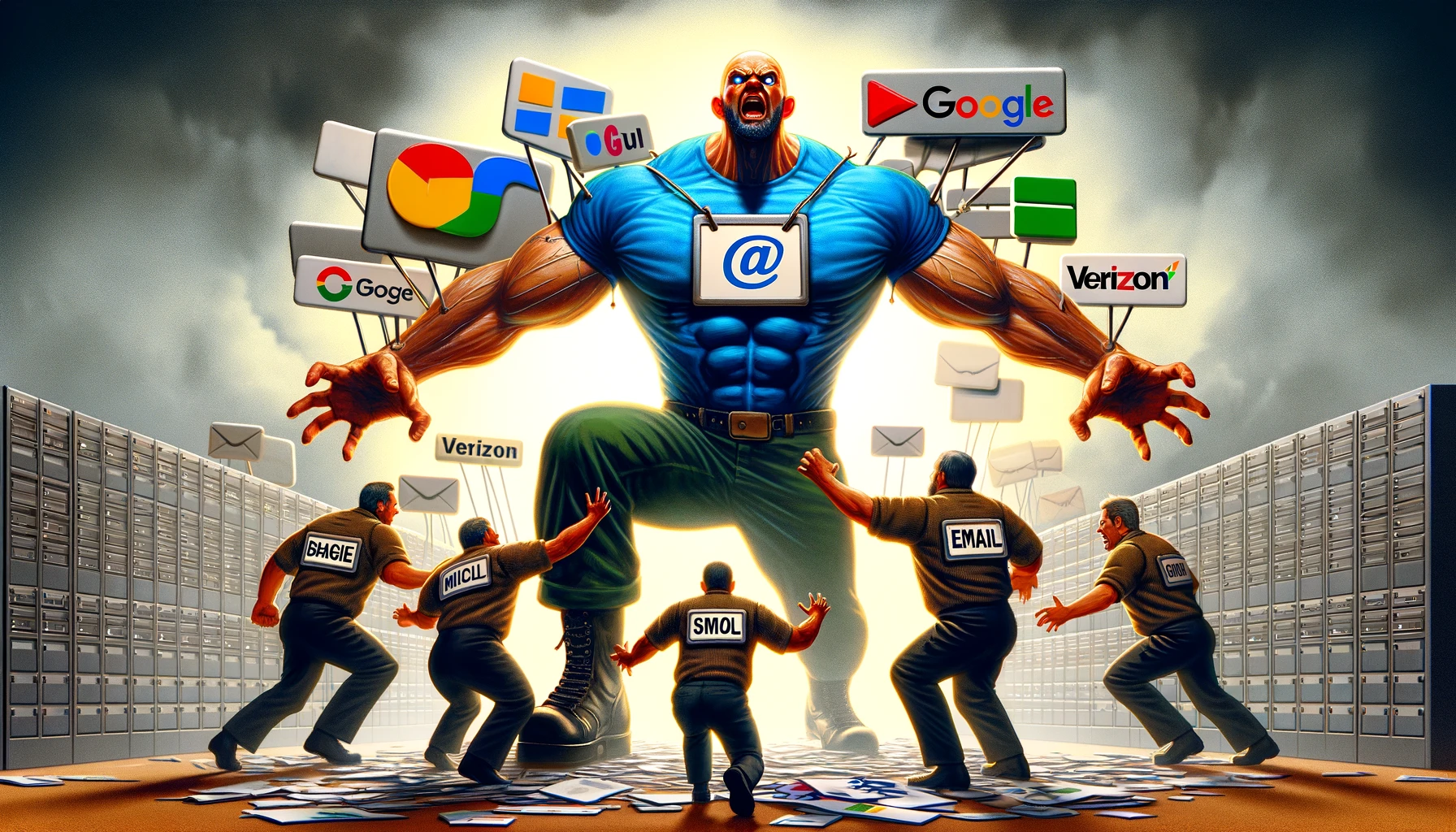A Long History with Email
Let’s talk about the big business email monopoly and possible antitrust violations they may be engaging in. I have worked in this business for a very long time since putting up an early BBS (Bulletin Board System) back in 1977 (see more at https://access-80.com) and operated CharlesWorks since 1998. So I have been involved with email and using computers to send electronic mail and messages pretty much shortly after its inception. Over the years, I’ve seen small companies like my own penalized simply because they are small. The playing field isn’t level whatsoever, and it’s way past the time to shed light on the unfair practices of large email providers.

The Big Business Email Monopoly Players
Many people find it convenient to forward their domain based emails to their Gmail, Hotmail, Outlook, or AOL email accounts. These platforms are just a few of those run by massive companies like Google (Gmail), Microsoft (Yahoo and Hotmail and Outlook), and Verizon (AOL). At CharlesWorks, in addition to leasing and reselling some hosting services, we run mostly our own website and email hosting infrastructure. This means we own and operate many of our own servers connected through our own high speed fiber Internet connection.
I have noticed over many years now that these giant companies consistently rate-limit, slow down, or outright disallow emails sent from my mail servers and web servers of small companies like mine. This is particularly problematic because my own web servers often send form outputs for my web clients’ websites via email for their business and personal websites.
The Ongoing Battle
I’ve been fighting mostly with Microsoft, in particular, who I believe owns Outlook, Hotmail and Yahoo, about this for many years. It’s a constant struggle to get emails from our servers to reach their intended recipients who use email addresses ending in @outlook.com, @hotmail.com, and @yahoo.com without being blocked or delayed. Countless dollars have been spent on labor time having to deal with these issues – reducing our ability to be competitive in this field. There appears to be no recourse with the giants.
The Form Mail Issue
Spammers frequently exploit forms on websites to push spam messages to website owners. Even small hosting companies like CharlesWorks can use tools like reCAPTCHA (see more at https://charlesworks.com/acquiring-recaptcha-api-codes/ about hooking up reCAPTCHA) and other software like CleanTalk (a paid software you can see more about at https://charlesworks.com/cleantalk-the-best-security-and-antispam-plugin-used-by-charlesworks/) to reduce spam. Despite these measures, the blame for spam often falls unfairly on the small company operating the web server, not the spammers themselves.
The Email Forwarding Dilemma
Spammers also send junk mail to known and guessed email addresses. People often use forwarding to centralize their email checks. For example, they’ll forward their emails to a Gmail account. When the original account, usually on their domain that we handle, forwards junk email, it tags our email server as spamming.
I feel frustrated when my Microsoft account forwards my mail to a Gmail account without issues. That frustration stems from the fact that the Microsoft server sending my emails does not get tagged as spamming in that case. This double standard gives large companies like Google, Microsoft, GoDaddy, and Tucows an unfair advantage over smaller players like CharlesWorks.

A Call for Fairness
The solution isn’t to block other servers entirely. Email servers should place items considered spam into appropriate spam or junk email folders. Most mail server software has this capability. This approach would allow people to view potential spam messages rather than never seeing them.
Practical Steps to Take
To alleviate this issue, I suggest reversing the process most people use. Instead of forwarding domain emails to large providers, directly check your domain email. Make your main email address the one you check, and forward emails from Hotmail, AOL, Outlook, etc., to your domain email. We don’t disallow email from them like they do from us.
The Ultimate Solution
We need federal legislation to prohibit email carriers from disallowing email from other U.S.-based servers. Consequently, email servers can filter emails into spam or junk folders while keeping them available for viewing.
The Danger of Forwarding
Forwarding emails to larger companies’ platforms often marks you as a spammer. Consequently, when a small company’s mail server deems one email as spam, everyone else on that server suffers the consequences of that blocking.
Conclusion
It’s high time we address the email monopoly of big businesses. Small companies deserve a fair chance to operate. They should not face unfair penalties. Let’s push for change and ensure that all players, big and small, can compete on an even playing field.
If you are looking for articles on spam, please check some of these:
https://charlesworks.com/another-lying-spammers-bs/
https://charlesworks.com/how-to-manage-spam-comments-in-your-website/
https://charlesworks.com/dealing-with-website-form-and-comment-spamming/
https://charlesworks.com/adding-akismet-comment-spam-protection/
Or search the https://charlesworks.com/resources page for even more!


